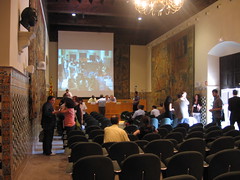
Last week I went to the Institut d’Estudis Catalans in Barcelona for the Euroscience Open Forum Satellite Event organised by Science Commons. The event brought together together lawyers, scientists, policy makers, stakeholders and representatives from many different groups and organisations interested in open access and open data in scientific research from across Europe.
The event did a great job at reinforcing the sense of a shared pan-European vision for open science – which was articulated elegantly in their four recommendations:
- open access to literature from funded research
- access to research tools from funded research
- data from funded research in the public domain
- invest in open cyberinfrastructure
While all of these areas are related to what we do at the Open Knowledge Foundation, the first, third and fourth of these are most relevant to our core remit and activities. We promote the Open Knowledge Definition as a standard for openness in scholarly literature and research data. Our CKAN project contributes to the open infrastructure for finding and re-using knowledge resources.
It was a good stock-taking excercise – to catch up with what other people have been doing in their respective domains, in their respective locations, as well as to try to identify the most significant challenges for the future.
There’s a brief note on the Science Commons blog and Cameron Neylon of Open Wetware has posted some comments and reflections (1,
2, and
3). Below are a few further jottings about the event.
Notes from ESOF Satellite Event
- Ricardo Guererro gave introductory remarks about the role and significance of the Institut d’Estudis Catalans.
- James Boyle of the Centre for the Study of the Public Domain gave a keynote about two visions for the future of science. One vision is a series of walled gardens, locked up behind passwords, paywalls and clickwrap agreements – much like the kinds of closed centralised networks that existed before the Web. The other is of a commons – where scientists can share and build on each others’ research. This latter vision is more like the Web, or like language – and may unlock an explosion of progress with respect to some of our most difficult scientific challenges, as well as allowing for new kinds of commercial innovation.
- David Prosser spoke about SPARC Europe and the SPARC Europe Seal for Open Access Journals (which we blogged about in April).
- Johannes Fournier spoke about what the Deutsche Forschungsgemeinschaft (DFG) – Germany’s main public funder of research – has been doing to support open access. He spoke about the importance of making data available for re-use and the value of allowing unexpected re-uses. Efforts to give researchers incentives to publish their data – included the possibility of increased citations.
- Christoph Bruch spoke about open access at the Max Planck Digital Library.
- Jens Vigen of CERN spoke about the need for new information systems and new e-Infrastructures for scientific research. He said “eScience requires digital shoulders”. He alluded to a study that indicated that 91% of High-Energy Physics researchers used community generated information systems – such as arXiv and SPIRES. This is particularly valuable to know with respect to projects like CKAN – which is effectively a community-driven resource for open knowledge!
- Leslie Chan spoke about his work on the Open Oasis project – an educational resource about all aspects of open access. The project is also mapping the history of OA and current OA publications and initiatives.
- Carlos Morais-Pires of the EC spoke about the state and future of e-Infrastructure in Europe and various EC funded infrastructure initiatives in different domains.
- Wilma Mossink of the SURF Foundation spoke about their work on licensing policies – alluding to their examination of different Creative Commons licenses, and legal tools for opening data such as the PDDL. Their work refers to the OKD.
- Michael Day of UKOLN spoke about their research into data – including the 2007 report Dealing with Data. He spoke about supra-institutional consortia of curators for data, and how a bottom up approach seems to be very effective in some domains.
- Tom Dedeurwaerdere spoke about his work on Microbial Commons and StrainInfo.net.
- Juan Carlos De Martin presented on COMMUNIA.
Dr. Jonathan Gray is Lecturer in Critical Infrastructure Studies at the Department of Digital Humanities, King’s College London, where he is currently writing a book on data worlds. He is also Cofounder of the Public Data Lab; and Research Associate at the Digital Methods Initiative (University of Amsterdam) and the médialab (Sciences Po, Paris). More about his work can be found at jonathangray.org and he tweets at @jwyg.








